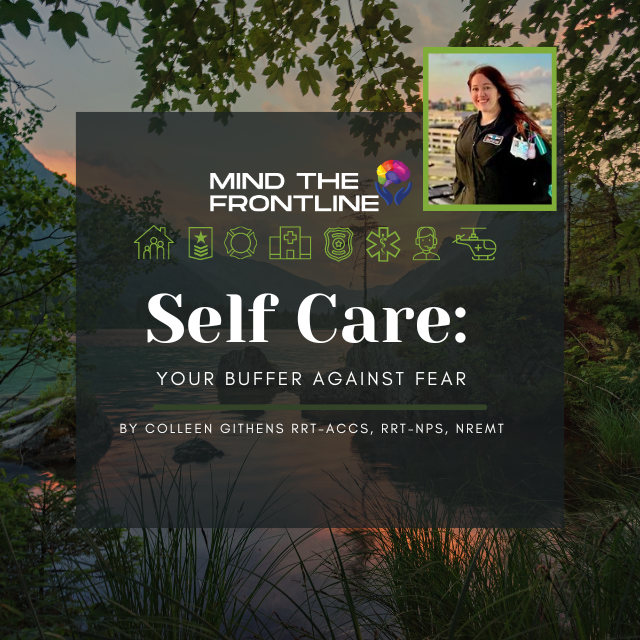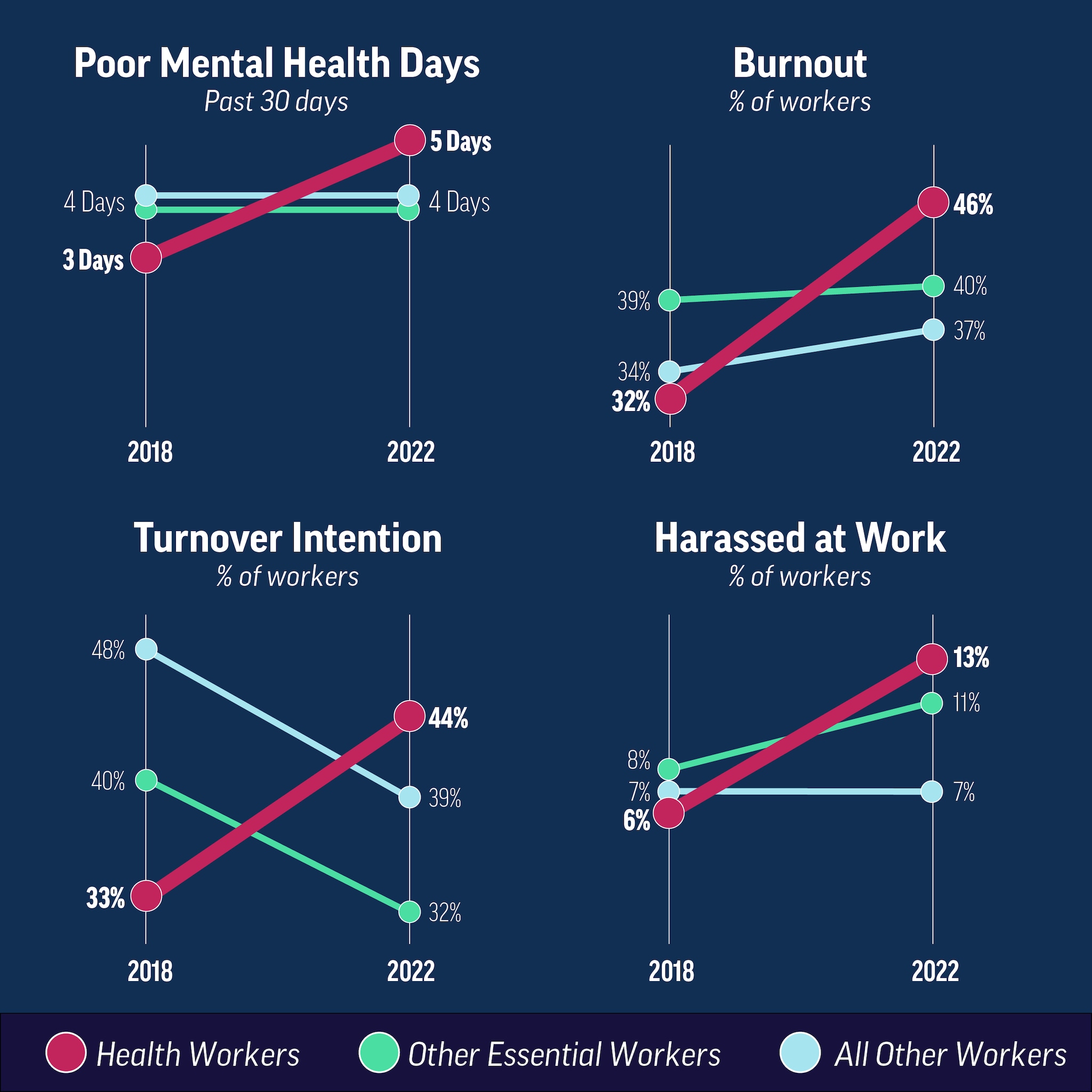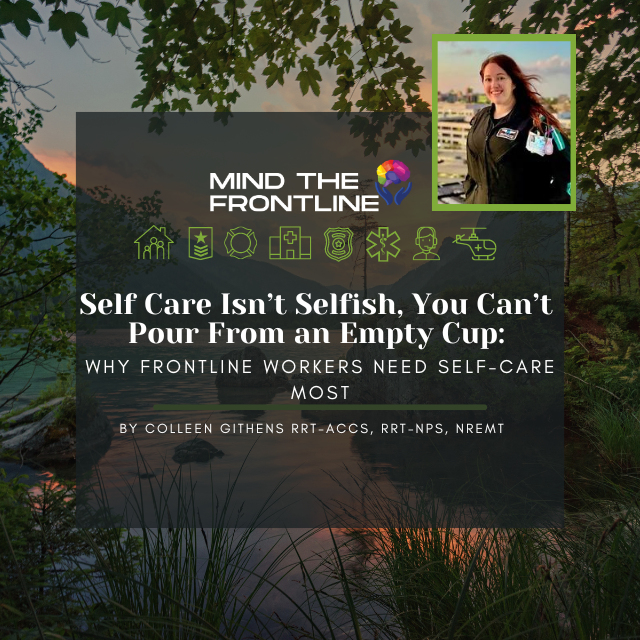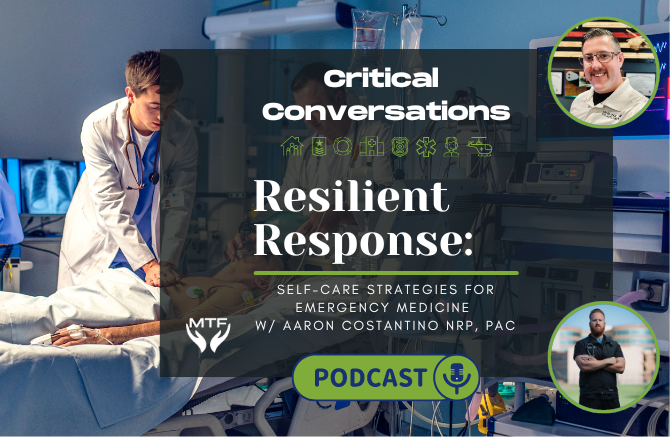Self-Care Isn't Selfish, You Can't Pour From an Empty Cup
We all know the saying, "You can't pour from an empty cup." This rings especially true for frontline workers – the firefighters, police officers,...
6 min read
Colleen Githens RRT-ACCS, RRT-NPS, NREMT
:
Apr 15, 2024

The relentless nature of frontline work takes a significant mental health toll. A staggering 45% of first responders report experiencing burnout, according to the International Association of Fire Fighters. Healthcare workers are not far behind, with a 2022 study by the National Academy of Medicine finding that over half of all healthcare workers reported burnout. These concerning burnout rates contribute to a rise in behavioral health issues. Studies estimate that 40% of healthcare workers develop conditions like depression and PTSD, compared to the 8-10% of the general population who experience PTSD according to the National Center for PTSD (2023). Notably, outside of military service, healthcare is considered the fastest growing industry for PTSD diagnosis. This highlights the significant mental health burden shouldered by our frontline heroes.

Frontline workers are the backbone of our communities. From healthcare professionals to social workers, firefighters to dispatchers, police to paramedics you face immense challenges every day. You witness hardship, navigate complex situations, and carry the weight of responsibility for others' well-being. It's no surprise, then, that fear can creep in and take hold. But what if there was a way to build a buffer against that fear, a shield to protect your mental and emotional health? That's where self-care comes in. Here's why prioritizing self-care acts as a buffer against fear, allowing you to show up as your best self, every day.
Chronic exposure to stressful situations can trigger the fight-or-flight response, leading to heightened anxiety and fear. This can manifest in various ways, impacting physical health (headaches, sleep problems) and mental health (depression, irritability). Fear can become overwhelming, hindering your ability to function effectively and care for yourself and others. Fear can also hinder decision-making and reduce empathy, both of which are crucial qualities for our work environments. Unchecked fear can become debilitating.
Imagine your mental and physical well-being as a shield. When you prioritize sleep, healthy eating, and exercise, you build resilience. Just like a strong shield deflects blows, robust well-being makes you better equipped to handle stressful situations. You'll have more energy to navigate challenges and a clearer mind to make critical decisions. Fortunately, self-care practices can equip frontline workers with the tools they need to manage fear and build resilience. Here's how:
By incorporating self-care into their routines, frontline workers can build a stronger foundation for emotional well-being. This, in turn, allows them to manage fear and reduce stress more effectively and continue their vital work with greater clarity and compassion.
Self-care doesn't have to be complicated but it does have to be intentional. Start by identifying small, manageable steps you can incorporate into your daily routine. Here are some ideas:
Communication is key! Once you've identified your self-care practices and started incorporating them into your routine, talk to your loved ones about your efforts. Explain the benefits you're experiencing and how self-care helps you be a better version of yourself for them and for your work. Let them know what kind of support would be most helpful. Do you need them to hold you accountable for sticking to your self-care schedule? Maybe you'd appreciate them joining you for a walk or a relaxing activity. Do you need them to give you space for alone time? By openly discussing your self-care journey, you can turn your loved ones into cheerleaders, fostering a supportive environment where self-care becomes a collaborative effort, not a solo mission. This also allows them to see you following this and implement their own self-care!
Prioritizing self-care is not a sign of weakness; it's an act of strength and a crucial asset in your ability to serve others effectively. Organizations can also play a vital role in supporting self-care by promoting healthy work environments and providing resources for stress management and mental health support.
Self-care isn't selfish; it's an investment in your well-being, which ultimately translates to better service for those who depend on you. Start small, and prioritize activities that nourish you, whether it's spending time in nature, reading a good book, or simply taking a relaxing bath.
By prioritizing self-care, you build a buffer against fear, allowing you to navigate challenges with strength, resilience, and compassion. You deserve to feel your best, so take care of yourself.
Building a self-care routine doesn't have to be complicated. Here's a step-by-step approach to get you started:
.png?width=323&height=211&name=Selfcare%20routine%20(300%20x%20196%20px).png)

Colleen Githens is the Lead State Ambassador and Social Media Manager for Mind The Frontline. Colleen has been a Registered Respiratory Therapist for 14 years. She holds her ACCS and NPS specialties, along with being a NREMT. A specialist in her field, Colleen has practiced respiratory care in all patient populations and demographics. Most of her career in high level critical care, including a neonatal and pediatric flight team. Colleen now is a RRT with the VA Healthcare System in Maryland. The safety, mental health, and wellness of her peers and herself has been a priority for many years. Colleen is also a mom of 2 humans and 2 pups, along with volunteering as a Puppy Parent with Warrior Canine Connection for a future Service Dog in Training.
References
American Psychological Association. (2020, April 22). Building resilience. https://www.apa.org/topics/resilience
Headspace. (2023, March 1). Setting boundaries: How to say no and protect your time. https://www.youtube.com/watch?v=fuE-kZqDISE
International Association of Fire Fighters. (2023). IAFF Wellness Resources. [IAFF] . https://en.wikipedia.org/wiki/International_Association_of_Fire_Fighters
Mayo Clinic. (2023, March 8). Stress management. https://www.mayoclinic.org/healthy-lifestyle/stress-management/basics/stress-basics/hlv-20049495
National Academy of Medicine. (2022, September). Taking Action Against Clinician Burnout: A Call for Systemic Change. National Academies Press. https://nap.nationalacademies.org/catalog/25521/taking-action-against-clinician-burnout-a-systems-approach-to-professional
National Center for Complementary and Integrative Health. (2020, December). Mindfulness: An introduction. https://www.nccih.nih.gov/
National Center for PTSD. (2023, July 26). PTSD: National Center for PTSD. Veterans Affairs (.gov) https://www.ptsd.va.gov/
Nigam JA, Barker RM, Cunningham TR, Swanson NG, Chosewood LC. Vital Signs: Health Worker–Perceived Working Conditions and Symptoms of Poor Mental Health — Quality of Worklife Survey, United States, 2018–2022. MMWR Morb Mortal Wkly Rep 2023;72:1197–1205. DOI: http://dx.doi.org/10.15585/mmwr.mm7244e1
Neff, K. (2016). Self-compassion: The proven power of being kind to yourself. HarperCollins.
Seyedalikhani, A., Hosseinian-Farahani, F., & Ziaei, R. (2020). The mediating role of anxiety in the relationship between chronic stress and depression. Journal of Affective Disorders, 272, 1017-1023.
Explore many valuable First Responder Mental Health and Wellness resources on Mind the Frontline's online platform. Discover the link below to access a wide range of support and information tailored specifically for first responders.
Additional Mind the Frontline Resource's
Stay connected with Mind the Frontline on Instagram, Facebook, & LinkedIn.
$50 off code:frontline40
Invest in your mental health with the Mind Shield Health and Wellness Membership—a transformative resource tailored for first responders. For less than $4 per month, this 100% tax-deductible membership offers a suite of exclusive benefits designed to enhance your overall well-being.
Membership Highlights:
The Largest Online First Responder Mental Health and Wellness Resource Directory: Immediate access to a comprehensive database catering to the unique needs of first responders.
State-by-State Mental Health, Wellness, and Recovery Resources: Navigate a localized guide for personalized support.
MindShield 24/7 Debrief Hotline: Confidential and secure debriefing space, available whenever you need it.
Virtual 1-1 Peer Support: Connect with a supportive network of peers through our virtual platform.
Mind the Frontline's Preferred Mental Health Providers List: Access trusted mental health professionals aligned with our mission.
Discounts to Mental Health Apps: Exclusive discounts on leading mental health apps like Headspace and more.
Recommended Books, Podcasts, and Resources: Curated selection to enhance your mental health journey.
Weekly Blog Articles/Podcasts: Stay informed and inspired with regular content delving into crucial insights and topics.
Interactive Workshops and Webinars: Engage in dynamic sessions promoting mental health, career development, and overall well-being.
Mindfulness and Meditation Resources: Tools for incorporating mindfulness into your daily routine.

We all know the saying, "You can't pour from an empty cup." This rings especially true for frontline workers – the firefighters, police officers,...
-3.png)
Unlock the secrets to holistic well-being by mastering the four pillars of self-care, crucial for first responders and veterans.

Discover effective self-care strategies and team dynamics in emergency medicine to enhance well-being and resilience among first responders.